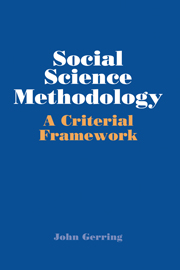Postscript: Justifications
Published online by Cambridge University Press: 05 June 2012
Summary
Surely, in a world which stands upon the threshold of the chemistry of the atom, which is only beginning to fathom the mystery of interstellar space, in this poor world of ours which, however justifiably proud of its science, has created so little happiness for itself, the tedious minutiae of historical erudition, easily capable of consuming a whole lifetime, would deserve condemnation as an absurd waste of energy, bordering on the criminal, were they to end merely by coating one of our diversions with a thin veneer of truth. Either all minds capable of better employment must be dissuaded from the practice of history, or history must prove its legitimacy as a form of knowledge. But here a new question arises. What is it, exactly, that constitutes the legitimacy of an intellectual endeavor?
–Marc BlochI have argued that the various disciplines of the social sciences may be conceptualized as elements in a single quest – to understand the world of human action in a scientific manner (Preface). I have argued, further, that there are good reasons for seeking greater methodological unity among the social sciences (Chapter I). I have argued, finally, that this goal is best served by a criterial framework (summarized in Chapter 2 and set forth in Parts I, II, and III of the book). This framework, I claimed, better accounts for what social scientists do – or at least for what they try to do – than other extant methodologies.
Information
- Type
- Chapter
- Information
- Social Science MethodologyA Criterial Framework, pp. 244 - 258Publisher: Cambridge University PressPrint publication year: 2001
